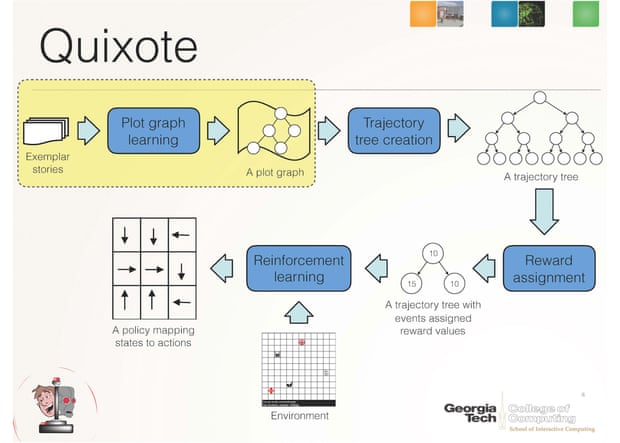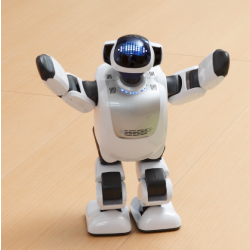I just found this post about a potential presidential candidate and thought you guys might enjoy:
Forget Trump or Bernie, how about Watson for President?
A.I.A.I. Blog
Thursday, February 18, 2016
Robots and Human Values
As we were reading I, Robot and after watching the film, it comes into question if the three laws of robotics suggested by Asimov would really be the saving grace of Artificial Intelligence and humanity. When the three laws were modified slightly, the robots in the story were able to find loopholes such as risking one human's life in order to save more humans in the future. Though the movie did not follow the plot of the book in the slightest, I found it interesting that the one robot that ended up the "good guy" was the one that was not programmed to follow the specific three laws. Perhaps one of the things overlooked is robots learning human values.
In this article written by Alison Flood posted on The Guardian website, She addresses a new strategy in order to teach Robots to learn human values. And what is the new method attempting to teach human values to AI? Storybooks. We all remember classic stories from growing up, teaching patience and respect for others. Well now Mark Riedl and Brent Harrison, from the School of Interactive Computing at Georgia Institute of Technology have created a system that acts as a prototype that is able to learn human values and social conventions from those childhood stories. They call this system Quixote. Quixote is able to run simulations virtually and gets rewarded after doing the correct actions similar to the story (see chart below).
I believe this is a very interesting way to attempt to solve some of the issues and concerns that face AI. However, I began to wonder if this may also be dangerous depending on the type of story fed to the robot. I am sure as AI continues to advance, we shall see an increase in the human values encoded into robots and artificial intelligence.
Tuesday, February 16, 2016
Technological Singularity
I think I would have the honor to be the last student to post an article to AIAI blog in this term. Here is a new term for y'all to enjoy. Technological Singularity. A Google search will lead you to this wiki page. And I am sure as hell that you will be bored by the flood of words on that page (not like you guys have any time to read the blog anyway).
To sum it up, it is a hypothetical event in which technology grows too fast, artificial intelligence outsmart humans and humans cannot predict what happens in the future anymore because everything is out of human's understanding. You know stuff like Terminator and The Matrix.
Here is an article about what could lead to the singularity and how we could prevent it. There are four ways that a technological singularity could happen
- Scientists could develop advancements in artificial intelligence (AI)
- Computer networks might somehow become self-aware
- Computer/human interfaces become so advanced that humans essentially evolve into a new species
- Biological science advancements allow humans to physically engineer human intelligence
And the first three leads to machines taking over us.
And here is some more articles discussing this issues (they are shorter than the wiki page and the previous articles)
Saturday, February 13, 2016
Robots in Elderly Care and Nursing
In this article (see my quick translation here) we are told about a little robot in Japan named PALRO (see picture, from the PALRO website) that's being used to lead group recreational activities and exercises for the elderly at a particular nursing home. The article itself doesn't directly discuss anything hard-hitting, but as I read it I had to grapple with some of my own concerns about robots as a replacement for human interactions, the same kind of worries that came to mind when I read Asimov's "Robbie."
In summary, the article describes how PALRO's introduction has been enjoyable for the elderly patrons of this "nursing home" (actually called a "day service," it's a kind of outpatient senior center or home-visiting nursing service) as well as helpful for the staff. The benefits to the staff were ones I hadn't expected; I thought that PALRO's presence might leave the staff only trivial things to do, but in reality PALRO gave them the chance to focus on the more time-intensive but also more-important work of one-on-one rehabilitation, which is really also a plus for the patrons.
As I recently commented on the "How do you really feel about AI?" post on the blog, I have some reservations about using robots as a replacement for human interaction, as I don't think it's healthy. (Even interaction with other people through the computer is a questionable replacement for face-to-face interaction.) But this particular article made me reconsider that, because my experience with the elderly in America is that they don't get the kind of interaction that they need from other people. (I'm not sure if this is the case in Japan, however.) So, while it may not be ideal that they hae interactions with robots instead of people, it is better than some of the things that happen in nursing homes here, especially if the robot allows the staff to give more personalized attention to those that need it.
It's hard to connect this to much of our class discussion, because we didn't address human-robot interactions much except when we discussed the imperfections of chatbots, but I think it's a worthy topic. It pops up in a lot of sci-fi, not just I, Robot, so people have been thinking about it for some time. I'm curious to know my classmate's thoughts on the matter--either on this particular use of robots or on robots as "friends" in general.
(This does bear some similarities to Pepper, but as far as I know PALRO is a little less sophisticated (?) and is meant to engage people in chatting and activities, not to recognize and react to emotions. Maybe this affects your thoughts on the subject.)
Wednesday, February 10, 2016
Japanese company opens all-robot factory; some insight on economic decisions.
This article about the Japanese cosmetic company Shiseido opening an all-robot factory has some interesting information on the economics behind their decision. For example, "in other countries, automation often fuels concerns about layoffs, yet Japan’s shrinking labor force justifies a move to more robots."
Tuesday, February 9, 2016
Are you hazy on iRobot details??
Hello, if you HAVE read iRobot but may be confused about some of the details. This will assist you in clearing up the haze. Click here.
For fun
Here is a robot solving a rubix cube game. Just a little fun before the exam. Go here
Subscribe to:
Posts (Atom)





